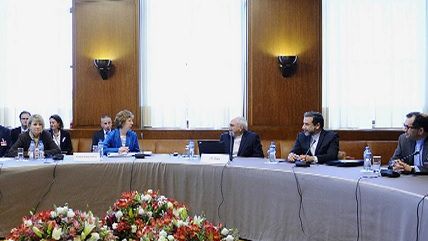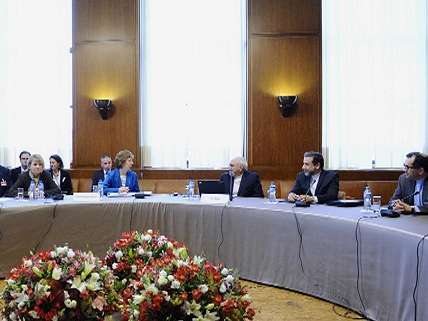Sens. Rand Paul, Barbara Boxer Working on Postponing Iran Sanctions Votes
New Republican Congress wants to vote on new sanctions now, before talks between Iran and the West end, and some Democrats agree.


The Congress is finally trying to step up its role in foreign policy, not to reassert its powers of war making or defining "Offenses against the Laws of Nation," which it's lost over the last half century, but to regulate commerce with foreign nations, and specifically to place new sanctions on Iran. It's not a surprising step for the new Republican Congress, although some of the "infighting" may be new.
Hawks in Congress, Republican and Democrat, worry about talks between Iran and the U.S., the United Kingdom, China, Russia, France, and Germany over the Iranian government's nuclear development program. Sens. Bob Menendez (D-NJ) and Mark Kirk (R-Ill.) sponsored legislation that would trigger wider sanctions on Iran if negotiators on all sides didn't hit certain benchmarks by July. Sens. Rand Paul (R-Ky.) and Barbara Boxer (D-Calif.) are now working on legislation that would trigger votes in Congress on new sanctions against Iran only if the country were found to be violating agreements it's made in the nuclear talks.
The aim of the negotiations is to impose limits on Iran's nuclear program that would prevent it from developing a nuclear weapon. Hawks in Israel, which likely has nuclear weapons and is also the closest potential target at which Iran might point nuclear warheads, worry about the ongoing talks too.
Israeli Prime Minister Benjamin Netanyahu's planned March 3 address to Congress is supposed to focus on those fears—Netanyahu, facing re-election on March 17, is trying to frame the speech as a "moral obligation." The White House says it was not informed of Speaker John Boehner's invitation to Netanyahu in advance, something Boehner and Netanyahu have both faced criticism for, and that President Obama won't meet with Netanyahu when he comes to Washington in March.
Sanctions, even if they were passed by Congress, are unlikely to be signed by the president, whose administration has participated in the talks for years and has warned against premature sanctions. Nevertheless, the move can play into the hands of hardliners in Iran, who share the goal of wanting to scuttle the negotiations between Iran and the West. Proposals like the one by Paul and Boxer can help focus the White House and other participants in the negotiations on results. An op-ed by the foreign ministers of Britain, France, Germany, and the European Union urged against imposing new sanctions but re-iterated support for the same if Iran proved unwilling to agree to a deal on the West's terms, highlighting how small the divide between moderates and hardliners can actually be.


Show Comments (67)